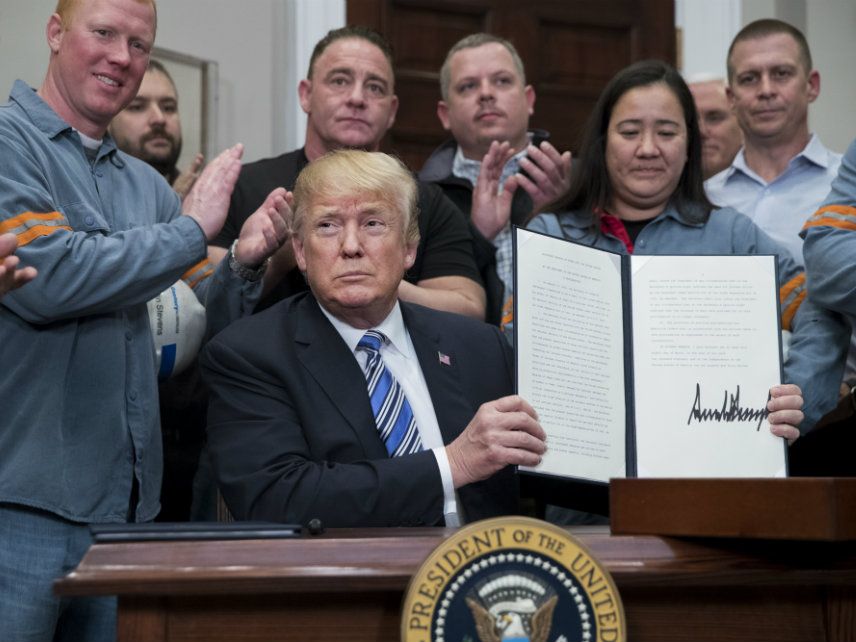Even Protectionists Agree: Tariffs Will Cost American Jobs
A pro-tariff organization projects the best-case scenario for tariffs, and it still ends up looking pretty bad.

Economists and pro-trade organizations were quick to criticize President Donald Trump's decision to impose tariffs on imported steel and aluminum, a maneuver that many analysts say will harm far more workers, businesses, and consumers than it will help.
Now, it seems, even pro-tariff protectionists agree with that assessment.
A study released this week by the Coalition for a Prosperous America—and trumpeted on the pro-tariff organization's website under the not very convincing headline "Steel and Aluminum Tariffs Produce Minimal Impact on Jobs"—shows that Trump's tariffs will produce an overall decline in both jobs and gross domestic product, leaving Americans with less work and less wealth.
While tariffs will boost employment in the production of iron, steel, and aluminum, those gains will be offset by bigger losses across other sectors of the economy. The manufacturing and construction sectors rely heavily on steel, and those companies would pay more for it due to the tariffs. Unsurprisingly, they are projected to lose the most jobs as a result of the cost increase. The U.S. manufacturing sector is projected to lose 10,000 jobs and the construction industry is projected to lose 7,500 jobs, according to CPA's analysis. Jeff Ferry, CPA's research director, tries to put a positive spin on those jobs loses by claiming that "losses would be negligible, as the 19,000 jobs gained in the steel and aluminum sectors would largely offset any job losses in metal-consuming industries," but that's probably not much comfort to workers in auto plants across the country, keg manufacturers in Pennsylvania, or farm suppliers in Iowa.
The study also fails to account for the potential fallout from retaliatory tariffs that could be imposed by the European Union or China. The study claims that agricultural jobs will increase because of tariffs, but the farm industry is likely to be a major target in any trade war launched against the United States.
"The debate is no longer whether these tariffs will be harmful to the U.S. economy—the protectionists have effectively run a white flag up the pole on that question—but rather the magnitude of the damage," concludes Colin Grabow, a trade policy analyst at the Cato Institute, after reviewing the CPA study.
Other projections suggest the damage could be much worse. The most detailed analysis of Trump's tariffs comes from the Trade Partnership, a Washington-based pro-trade think tank. According to that study, tariffs could grow the steel, iron, and aluminum industries by about 33,400 jobs, but will also wipe out more than 179,000 other jobs. That's about 146,000 net job losses—or five jobs lost for every job gained.
And that's before retaliatory tariffs kick-in. If the EU and other American trading partners follow through on current threats to raise import taxes on American goods, a separate Trade Partnership analysis shows, domestic job losses would soar to over 468,000.
Perhaps the most enjoyable part of the CPA study is the group's attempt to find some scenario in which jobs are not lost under Trump's tariffs. Because the tariffs will raise an estimated $5.97 billion in new revenue for the federal government, and "if this revenue is proactively invested by the federal government, it could lead to net job creation."
Given the federal government's history with money, that seems lie a pretty big "if."
But there it is. Tariffs can be good for the economy if you discount possible retaliation, if you underestimate the consequences on agricultural jobs, and if you trust the federal government to spend $6 billion in the wisest way possible. That's literally the best argument the protectionists have made.


Show Comments (15)